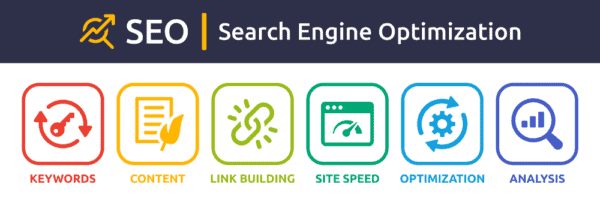Google Ranking Factors for 2024 (The 10 Most Important)
Welcome to our deep dive into the world of Search Engine Optimisation (SEO) as we explore the 10 most crucial factors determining Google rankings in 2024. Did you know there are over 200 Google ranking factors? Ranking factors are used by Google to judge how well your website content matches a particular online search.
Understanding how Google ranks websites is essential for anyone looking to improve their online visibility and drive more traffic to their site. In this guide, we’ll unpack what a Google ranking factor is and why they remain pivotal in the ever-evolving digital landscape.

Definition of a Google Ranking Factor
A Google ranking factor is a criterion applied by Google’s algorithms to evaluate web pages and determine their placement on search engine results pages (SERPs). These factors can include various elements such as content quality, backlinks, and mobile friendliness. Each factor weighs differently in the algorithm, influencing how prominently a website features in search results.
Explanation of the significance of Google Ranking Factors in 2024
By 2024, the digital ecosystem has become even more competitive. Google’s ranking factors have evolved, making it crucial for website owners to stay informed and adapt their strategies accordingly. These factors are significant because they directly affect a website’s ability to attract organic traffic, which is a key driver of business growth and online success.
The 10 Most Crucial Factors Determining Google Rankings in 2024
High-quality Content
In the realm of SEO, content is king. High-quality content that is informative, engaging, and valuable to readers continues to reign supreme. Google aims to provide users with the best possible answers to their queries, and well-researched, original content is favored by the algorithms. This includes the use of relevant keywords, comprehensive coverage of the topic, and the freshness of the information provided.
Backlinks
Backlinks, or inbound links from other websites, serve as endorsements of content quality. A site with a high number of quality backlinks is often perceived as trustworthy and authoritative, which can significantly boost its Google ranking. It’s important to focus on earning backlinks from reputable sites that are relevant to your niche.
Search Intent and Content Relevancy
Understanding and matching the user’s search intent has become paramount. Content that aligns closely with what users are searching for will rank higher. This means that keyword stuffing is out, and creating content that genuinely addresses the questions, needs, and interests of your audience is in.
Website Loading Speed
Speed matters. In an age where users expect immediate results, a slow-loading website can be penalized in search rankings. Google places a premium on providing a swift user experience, and sites that load quickly on all devices are likely to see a rankings boost.
Mobile Friendliness
With mobile devices accounting for a significant portion of web traffic, having a mobile-friendly website is non-negotiable. Google’s algorithms prioritize websites that provide a seamless experience on mobile platforms, including easy navigation and readability on smaller screens.
Domain Authority
Domain authority reflects the overall reputation and trustworthiness of a website based on several factors, including age, popularity, and size. Websites with high domain authority are typically ranked higher, as they are considered more credible sources of information.
Keyword Optimisation
Strategic use of keywords helps signal to Google the topics and relevance of your content. However, keyword optimization is not just about frequency; it’s about placement, relevance, and context within high-quality content.
Website Structure
A well-organised website structure helps users and search engines navigate your content efficiently. A logical hierarchy, clear navigation, and the use of sitemaps can enhance the discoverability of pages and positively impact rankings.
Website Security
Security is a top concern for users and search engines alike. Websites with HTTPS encryption are favored in Google’s rankings as they protect user data and offer a secure connection, which is especially important for sites that handle sensitive information.
On-page Experience
Google’s algorithms now consider the overall on-page experience, which includes factors like user engagement, interactivity, and visual stability. Providing a positive user experience is key to keeping visitors on your site longer, reducing bounce rates, and improving rankings.
These 10 factors represent what are considered the most important aspects to consider when optimising for Google rankings in 2024. By focusing on high-quality content, earning quality backlinks, ensuring content relevancy to search intent, optimising for mobile and speed, building domain authority, using keywords wisely, structuring your website for ease of use, securing your site with HTTPS, and delivering an excellent on-page experience, you can enhance your website’s SEO performance and increase your online visibility. Staying up-to-date with Google’s evolving algorithms and adapting your strategy accordingly is vital for any successful online presence.
While we’ve attempted to list the most common and important ranking signals, there are definitely many more to consider. But, if you master these fundamentals first, we guarantee you’ll see a major improvement in Google rankings and organic search traffic.





